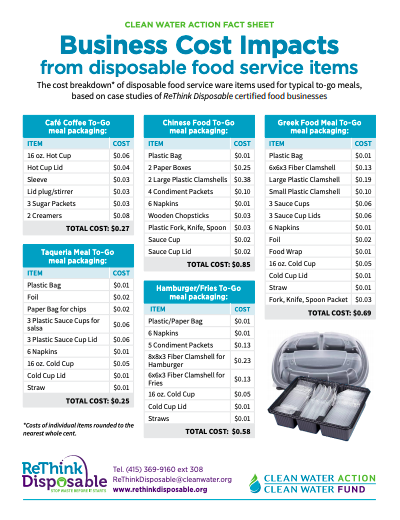
Amazon’s Plastic Problem Revealed
How Amazon is flooding our communities, environment, and oceans with hundreds of millions of pounds of plastic packaging and how they can stop.

Plastics Pose a Threat to Human Health
Authoritative reports shows plastics and microplastics are pervasive sources of exposure to dangerous endocrine-disrupting chemicals.

Microplastics weathered by water are more likely to infiltrate an animal’s cells
A new study finds microplastics exposed to freshwater or saltwater for several weeks are around 10 times more likely to enter the cells of mice compared to pristine particles.

Plastic pollution is killing marine megafauna, but how do we prioritize policies to reduce mortality?
Pollution by plastic and other debris is a problem affecting the world's oceans and is increasing through time... Marine megafauna are known to mistakenly eat anthropogenic debris and die from consequent gastrointestinal blockages, perforations and malnutrition, as well as suffer sublethal impacts.

Plasticenta: First evidence of microplastics in human placenta
Microplastics are particles smaller than five millimeters deriving from the degradation of plastic objects present in the environment. Microplastics can move from the environment to living organisms, including mammals. In this study, six human placentas, collected from consenting women with physiological pregnancies, were analyzed by Raman Microspectroscopy to evaluate the presence of microplastics.

Are Bioplastics and Plant-Based Materials Safer Than Conventional Plastics? In Vitro Toxicity and Chemical Composition
Plastics contain a complex mixture of known and unknown chemicals; some of which can be toxic. Bioplastics and plant-based materials are marketed as sustainable alternative to conventional plastics. However, little is known with regard to the chemicals they contain and the safety of these compounds. Thus, we extracted 43 everyday bio-based and/or biodegradable products as well as their precursors, covering mostly food contact materials made of nine material types, and characterized these extracts using in vitro bioassays and non-target high-resolution mass spectrometry.

Choked, Strangled, Drowned: The Plastics Crisis Unfolding In Our Oceans
After surveying dozens of government agencies, organizations and institutions that collect data on the impact of plastic on marine animals, Oceana found evidence of nearly 1,800 animals from 40 different species swallowing or becoming entangled in plastic since 2009. Of those, a staggering 88% were species listed as endangered or threatened with extinction under the Endangered Species Act.

Talking Trash: The Corporate Playbook of False Solutions to the Plastic Crisis
This report investigates industry tactics in the face of an unprecedented plastic pollution crisis and growing public pressure to address it.

Plastic’s Toxic Additives and The Circular Economy
This Plastic’s Toxic Additives and the Circular Economy publication describes a number of general issues concerning the problems associated with plastics and the obstacles to adopting a circular economy approach, and focuses in particular on the problems related to chemical additives.

All Talk and No Recycling: An Investigation of the U.S. 'Chemical Recycling' Industry
This report provides an assessment of failed, proposed, and existing projects in the United States and demonstrates that the industry is once again proposing to build a new network of waste and burn facilities. Under the guise of “chemical” or “advanced” recycling, the industry is lobbying for and advancing development of plastic-to-fuel (PTF) facilities that will only make the plastic crisis worse while diverting public and private investment dollars away from real solutions.

Health Expert Statement Addressing Safety of Reusables and COVID-19
Based on the best available science and guidance from public health professionals, it is clear that reusable systems can be used safely by employing basic hygiene.

Message About Bioplastics From Composters Serving Oregon
Nine reasons why Oregon composters don’t want “compostable” packaging or serviceware delivered to their facilities.

Plastic Atlas Second Edition: Facts & Figures About the World Of Synthetic Polymers
The Plastic Atlas has the hard facts, data and figures to prove that the story of plastic that industry is telling us is a myth. We need urgent and drastic reductions in plastic production, consumption and regulation at the local, national and global levels that tackle plastic pollution at the source.

Questions & Answers About Chemical Recycling
Q&A fact sheet on chemical recycling from GAIA

Global Brand Audit Report
“BRANDED Volume III: Demanding Corporate Accountability for Plastic Pollution” is out, revealing the Top 10 Corporate Plastic Polluters of 2020.

Plastic & Climate: The Hidden Cost of a Plastic Planet
The plastic pollution crisis that overwhelms our oceans is also a significant and growing threat to the Earth’s climate. At current levels, greenhouse gas emissions from the plastic lifecycle threaten the ability of the global community to keep global temperature rise below 1.5°C. With the petrochemical and plastic industries planning a massive expansion in production, the problem is on track to get much worse.

Fact Sheet: Business Cost Impacts From Disposable Food Service Items
The cost breakdown of disposable food service ware items used for typical to-go meals, based on case studies of ReThink Disposable certified food businesses.

Plastic and Health: The Hidden Cost of a Plastic Planet
This report provides a detailed overview of the health impacts associated with plastic at every stage of its supply chain and lifecycle, and it reveals the numerous exposure routes through which human health is impacted at each stage.

Fact Sheet: Cost-Savings to businesses Using Reusables
Net cost impact of switching from disposable to reusable food ware items for dine-in.

What’s in the Package? Unveiling the Toxic Secrets of Food and Beverage Packaging
Unveiling the toxic secrets of food and beverage packaging.

